Advent Hope
Advent is the time for Hope.
Advent 2016 brings to a close a year for which the new word is – as the Oxford English Dictionary has declared – ‘post-truth’. What hope, we might ask, for a post-truth world?
We have witnessed two election campaigns where truth and fact were in short supply. Since Brexit we have learned not to trust the polls. The events of previous months have revealed an enormous disconnect between what’s in hearts and minds, and the political systems that we take for granted in Western democracy. So many who simply don’t believe, any more, the established democratic processes. What lies underneath that disaffection?
Many things, of course. A sense of unfairness, as some experience real poverty and see others growing richer: the widening inequalities of society. There’s a retreat, too, from the idea of unity across regions and nations, a retrenchment: why should we think about the needs of strangers and aliens, when we’re up against it? A sense of being overwhelmed by the immense global movements – 60 million – fleeing war, violence, famine, insecurity; seeking a new home. And no longer do people trust experts, professional politicians, those with experience and learning – they belong to a political system seen not as democratic, but as elitist and corrupt. The fears and disaffection is not difficult to understand. It’s a world of change, of disrupted stabilities. A post-truth world.
A world also increasingly dominated by fear. It swirls around, transferred and contagious. It undermines trust between people, between nations. It’s fuelled by those who want the fear, who deliberately terrorise to destabilise. Or who themselves are expansionist, ready to take advantage of weakness. We are caught up in global forces, including the serious threat of global warming and climate change which makes us all more fearful than we tend to admit. Massive global forces at play which stir deep fear and destroy trust.
Dante put those who undermine trust at the very bottom of hell. Without trust, societies can’t function. We need a basic trust between people, between nations, for stability and negotiation to happen, for politics rather than war to prevail.
The most tempting thing to do, as we feel the fear, is to fall into the same dynamic ourselves. To start to think tribally, to divide the world into us and them. To lose compassion for the other – whoever she or he might be. To fail to see the humanity and dignity of all. To distrust rather than trust. And then fear begins to have its head.
That’s when our Christian faith needs to kick in. Because if faith in Jesus Christ means anything, it must give us the resources to dig deeper than the fear, to find a bedrock that is secure and enduring.
If our Christian faith gives us anything, it is the strong assurance that the fears and terrors of this present age are not the final word.
St Paul wrote to the Colossians of Christ:
For in him all the fullness of God was pleased to dwell, and through him God was pleased to reconcile to himself all things, whether on earth or in heaven, by making peace through the blood of his cross. Colossians 1.20
As Advent begins, that deep, rich, full time in which we prepare our souls to receive the Christchild at his nativity, his rebirth at the heart of the creation, we would do well to think more profoundly who Christ is. St Paul contemplates Jesus Christ, and sees in him all the fullness of God. As such Christ is the realisation of true humanity.
Karl Rahner wrote of the Eucharist as the anticipation of the eschaton – the fullness of the end and wholeness of all things. The eschaton, for Rahner, becomes not so much the chronological endpoint of time, but rather the full completion or wholeness of all things, already realised in Jesus Christ. The Eucharist becomes the Eschaton. Each time we celebrate Eucharist together, we are already there. We have arrived at the heart of fullness of God, the heart of the fulfilment of all things created by God. There is no other moment so full of God’s love and grace as that moment.
We cannot know how God’s thoughts and ways comprehend what we call evil. We know the destructive, callous, cruel evil that is passive harm, causing untold suffering; we know also how evil can take on a life of its own, and generate systems and forces that destroy, and leave survivors suffering for generations. We know how the erosion of trust, how terror destabilises nations, how evil works; how it undermines the foundations required for flourishing life.
If there is nothing more than the fullness of God, where is evil? Is evil beyond God? Surely not, for then there is something that is beyond God’s love and God is less than God.
The theologian Katherine Sonderegger asks what God knows of evil. What can God know of evil, without compromising God’s own goodness? She writes most interestingly of the way God comprehends all things – even evil.
The Divine Wisdom comprehends evil in its scope and depth and shocking negation, its utter poverty and lack. God alone comprehends evil as such. (The Doctrine of God, 2015: 373)
In this time, when we see through a glass darkly, we can know that God comprehends evil. God knows the cruelty of callous evil, and the consequences of natural disaster, creating havoc on peoples and communities, suffering beyond human imagination. God knows this; comprehends. Sonderegger’s account of Moses’ encounter with the Living God – I AM THAT I AM – in the Burning Bush, recalls the utter magnitude of the fullness of God, that consumes all that negates God. In the Fullness of Time, when all comes at last into the presence of the Fullness of God, then all dross will burn away, will be no more.
To affirm this is to affirm the ultimate goodness and truth of the Fullness of God.
As we gather for Eucharist, we know that in him all evil is embraced by God, comprehended by a power that is greater than anything evil can do, for that power is love.
All our mundane time revolves around this Eucharist moment. This moment that takes us to the heart of everything, where we are embraced within the heart of God. At that moment we enter the fullness of God, we are held in everlasting arms, surrounded, comprehended in love, our dross and sin judged and burned away.
In that moment of fullness we know the fullness of time, which is realised once and for all in Jesus Christ. It was realised in his birth, life, death and resurrection. It is realised again, and again, in Eucharist. All life revolves around this reality.
And because we know the fullness of God’s superabundant grace and love at that moment, we can also know that all will be well, and all manner of thing shall be well.
This Advent – as we contemplate the post-liberal, post-truth world in which we now live – let us hold fast that central Advent hope that the truth and reality of the fullness of God is realised in Jesus Christ. We are caught up into that truth and reality whenever we gather in Eucharist, whenever we are the Church worshipping, and receiving the real presence of Christ, in word and sacrament. This is the true reality, the ultimate truth. This is the reality that is God’s love, in which all things, all time is redeemed and finds fulfilment. This is the fullness of time, already realised in Christ, and God’s gift to us, now in this moment, and for evermore.
Frances Ward is Dean of St Edmunsbury, in the diocese of St Edmundsbury and Ipswich.
We invite you to make a contribution to the Church Urban Fund, which helps local groups work among the homeless and destitute, and tries, through local projects, to help them turn their lives around. You can support their work via this secure page www.cuf.org.uk/donate/advent-appeal/24/credit-card. Thank you.
8 CommentsAdvent Thoughts — and Actions
One evening a couple of weeks ago as I went to enter my parish church, I almost tripped over a homeless person sleeping on the ground in the church porch. It was a cold night in our fairly-prosperous middle-class town. Sheep and goats — parable. Real people — in a desperate situation. What can we do?
As the new liturgical year begins on the First Sunday of Advent, Thinking Anglicans will once more be publishing a series of reflective pieces from a number of writers. We hope that this will challenge all of us to proclaim God’s love to the world, and also to take some practical action.
Much of what we publish and discuss is about sexuality and gender, whether that is women in the clergy or LGBT issues — so this is a reminder to us all that following Jesus Christ has other aspects too. It isn’t to diminish the importance of those topics, but there are other critical issues as well. This falls within the broad remit of the social gospel, and the very firm belief that the proclamation of social justice and the social gospel — and actually doing it, not just talking about it — is important and is a crucial part of our mission as Christians, as thinking Anglicans. Intelligent, considered discourse and engaging with such discourse in the rest of life (not just with other Christians), is something we can do to help proclaim God’s love for everyone, in a world which for some people is a very difficult place.
Over the next few weeks as we prepare to celebrate the mystery of the Word-made-Flesh, society around us indulges in a frenzy of consumption. And alongside publishing some pieces on a general theme of homelessness we want to give our readers an opportunity to do something about it. We invite you to make a contribution to the Church Urban Fund, which helps local groups work among the homeless and destitute, and tries, through local projects, to help them turn their lives around. At this time of year the CUF mounts its Advent Sleepout Challenge. It may be too late to join in the Challenge itself, but we invite you to donate money via their secure page www.cuf.org.uk/donate/advent-appeal/24/credit-card.
2 Comments‘ “Lord, when was it that we saw you hungry or thirsty or a stranger or naked or sick or in prison, and did not take care of you?” Then he will answer them, “Truly I tell you, just as you did not do it to one of the least of these, you did not do it to me.” ’ (Matthew 25.44,45)
Jesus is risen
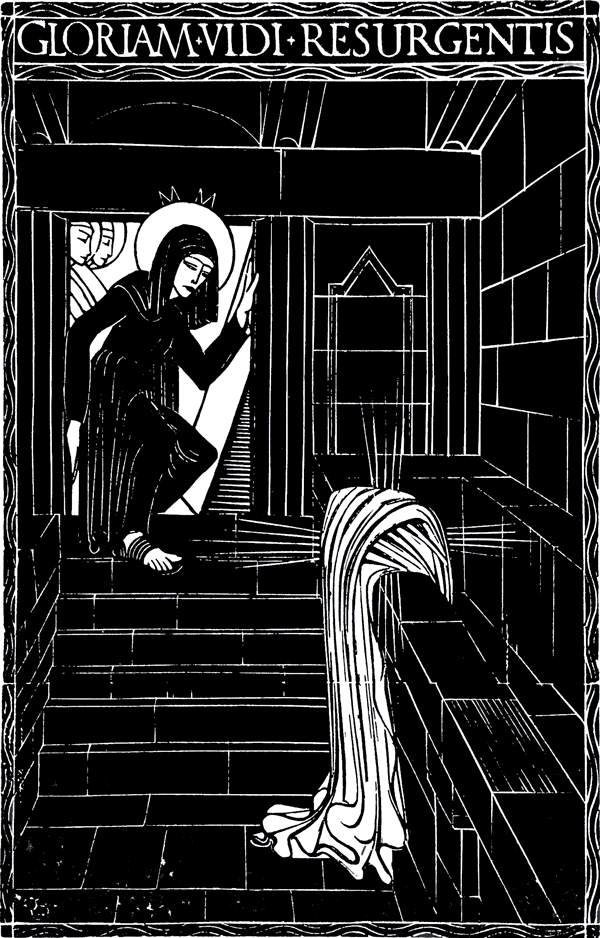
Mary Magdalene
“That Saturday was such a long day. From sunset after we had buried him, we could do nothing. We went home and locked ourselves in and cried. Oh, how we cried. His poor mother could not be comforted, and the rest of us were no better. We had loved him so much, and known his even greater love in return. He’d inspired us and taught us and given us hope. And then, so suddenly, he was dead. Still, we were determined to do what we could to give him a decent burial, so as soon as it was getting light on that Sunday morning, we were up and dressed. We rushed out with our oils and spices and off to the hillside. But when we got there we were in for a shock. The grave had been opened. We hadn’t expected that and we were very frightened. But we couldn’t have begun to imagine what had really happened. No one was going to believe us, a group of poor women from Galilee. Was it really possible that he was alive?”
Prayer
Lord Jesus, you were dead but now you are alive:
transform the torments of this world’s sin
that we may see your radiant glory.
You were raised from death to life:
may the power of your resurrection live in us,
that we may be channels of your true life beyond measure.
To you, Jesus, who have broken free from the bonds of death,
be honour and glory with the Father and the Holy Spirit,
now and for ever.
Amen.
illustration: from a wood-engraving by Eric Gill, 1917
2 CommentsJesus is placed in the tomb
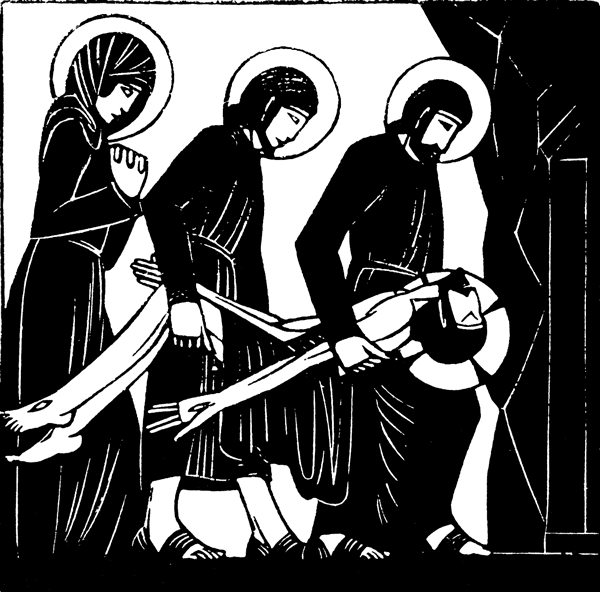
Joseph of Arimathea
“I’m Joseph of Arimathea. Like Nicodemus, I was a member of the Jewish Council. I’d only recently had a new tomb cut from the rock, near to the place. It was to be for me and my family. But it was beginning to get dark, and we had to bury his body before sunset. So I suggested laying him out there, and then we could come back on Sunday morning to tidy things up and anoint his body and say our prayers. That’s what we did, and the Governor ordered the tomb to be sealed and guarded. Of course, on Sunday morning it was all very different …”
Prayer
Lord Jesus, Lord of life, you became as nothing for us:
be with those who feel worthless and as nothing in the world’s eyes.
You were laid in a cold, dark tomb and hidden from sight:
be with all who suffer and die in secret,
hidden from the eyes of the world.
To you, Jesus, your rigid body imprisoned in a tomb,
be honour and glory with the Father and the Holy Spirit,
now and for ever.
Amen.
illustration: from a wood-engraving by Eric Gill, 1917
0 CommentsJesus is taken down from the cross

Nicodemus
“I’m Nicodemus. I had met him a few times and spoken to him. Now he was dead. We thought it was all over. All we could do now for him was to get him down from that cross and give him some dignity in death. My friend, Joseph, and I went to his mother to offer our help. I think Joseph went to see the Governor and got his permission. So we were able to get him down and cover him up. It was a terrible task, but it was the last thing we could do for him. It was awful to see his mother holding his limp body and kissing his bloodied face. And we just kept asking ourselves, Why; why did this happen?”
Prayer
Lord Jesus, your friends and family mourned at your death:
give strength and comfort to those who mourn.
To you, Jesus, your body cradled by your mother in death as in birth,
be honour and glory with the Father and the Holy Spirit,
now and for ever.
Amen.
illustration: from a wood-engraving by Eric Gill, 1917
0 CommentsJesus dies on the cross

the Centurion
“I was the Centurion. My job was to supervise the whole execution and see it through until the three men were dead, and keep the crowds under control too. As the occupying power in a troubled territory we were used to executing rebels. But I remember this one. Of course it was at Passover, and the crowds were large and worrying. The Governor had us put a sign over him — that he was king of the Jews, and this is how any king of the Jews would end up. And it went so dark that day, you’d think it was the middle of the night. But the way he died was different too. He didn’t curse, he didn’t incite his friends to rebellion, he seemed to be saying his prayers and talking to his mother and a few friends. Through all the pain, through all the indignity and humiliation, he seemed to know what he was doing. Everything about him proclaimed his innocence.”
Prayer
Lord Jesus, you died on the cross
and entered the bleakest of all circumstances:
give courage to those who die at the hands of others.
In death you entered into the darkest place of all:
illumine our darkness with your glorious presence.
To you, Jesus, your lifeless body hanging on the tree of shame,
be honour and glory with the Father and the Holy Spirit,
now and for ever.
Amen.
illustration: from a wood-engraving by Eric Gill, 1917
1 CommentJesus is nailed to the cross

a soldier
“The next thing was to nail him to his cross. Sometimes prisoners were tied up, other times we used nails. This time it was nails. It always took a whole squad of us to do this. Some to hold the cross secure, some to hold him and restrain him, then someone to hold the nail, and someone to hold the hammer. You had to put a nail through each wrist, so he would be held up by the nail between the two forearm bones. Then a single nail through both ankles. To breathe, a man would have to push himself up on these nails through his wrists and ankles.”
Prayer
Lord Jesus, you bled in pain as the nails were driven into your flesh:
transform through the mystery of your love the pain of those who suffer.
To you, Jesus, our crucified Lord,
be honour and glory with the Father and the Holy Spirit,
now and for ever.
Amen.
illustration: from a wood-engraving by Eric Gill, 1917
0 CommentsJesus is stripped of his garments

a soldier
“I was a soldier in the guard. We were just doing our job, something we’d done dozens if not hundreds of times before. Crucifixion was our business. First thing was to strip the prisoner. No dignity was left to a man being executed, not even a cover for his nakedness. His tunic was woven all in one piece, I remember that, and we threw dice to see who would have it.”
Prayer
Lord Jesus, stripped and beaten by your captors:
be with all who are deprived of their dignity
by the actions of their fellow human beings.
Your clothes were given over to a game of chance:
inspire us to protect the weak and innocent, and give dignity to all.
To you, Jesus, the Word made Flesh,
be honour and glory with the Father and the Holy Spirit,
now and for ever.
Amen.
illustration: from a wood-engraving by Eric Gill, 1917
0 CommentsJesus falls the third time

another woman
“After he’d fallen before, we’d run along the road, pushing through the crowd, through the city gate to the hill outside the walls. And just as we got there, he fell again, a third time. How much longer can this go on? And this time the soldiers don’t even try to force him to his feet. They’re already at the place.”
Prayer
Lord Jesus, three times you prayed that this cup might be taken from you
and three times you fell under the weight of the cross:
hear our pleading, our cries of agony.
Three times Peter disowned you
and three times you bade him feed your sheep:
forgive us when we disown you and strengthen us to share your love.
To you, Jesus, sharer in our suffering,
be honour and glory with the Father and the Holy Spirit,
now and for ever.
Amen.
illustration: from a wood-engraving by Eric Gill, 1917
0 CommentsJesus speaks to the women of Jerusalem

a woman
“My friends and I had been waiting for him to come to Jerusalem. We’d heard about the man from Galilee. We’d even seen him there and heard him speak. And now here he was. Surely it didn’t have to come to this? And as we cried he must have heard us, and drew on his reserves. ‘Don’t cry for me,’ he said, ‘cry for yourselves and your children’. How could he have known what would happen to us all these years later? Our beautiful city destroyed, and our Temple razed to the ground. Now there are no more sacrifices here.”
Prayer
Lord Jesus, the women of Jerusalem wept for you:
move us to tears at the plight of the broken in our world.
You embraced the pain of Jerusalem, the ‘city of peace’:
bless Jerusalem this day and lead it to the path of profound peace.
To you, Jesus, the King of peace who wept for the city of peace,
be honour and glory with the Father and the Holy Spirit,
now and for ever.
Amen.
illustration: from a wood-engraving by Eric Gill, 1917
1 CommentJesus falls the second time

a man
“We were walking into the city as the soldiers cleared the way out, so we stood to one side to watch. A man, helped by another man, was carrying his cross. Even with help he was struggling, and he stumbled and fell beneath the weight. Some of the crowd were yelling abuse at him, and others were crying. Despite everything there was something about him that stood out. I remember wondering who he was.”
Prayer
Lord Jesus, you suffered and fell under the ill-treatment of your captors:
be with all who cannot find the strength to get up and carry on.
Your captors were doing the job they had been given:
guard us from causing others to stumble and fall.
To you, Jesus, bearing the cross for the whole world,
be honour and glory with the Father and the Holy Spirit,
now and for ever.
Amen.
illustration: from a wood-engraving by Eric Gill, 1917
0 CommentsVeronica wipes the face of Jesus
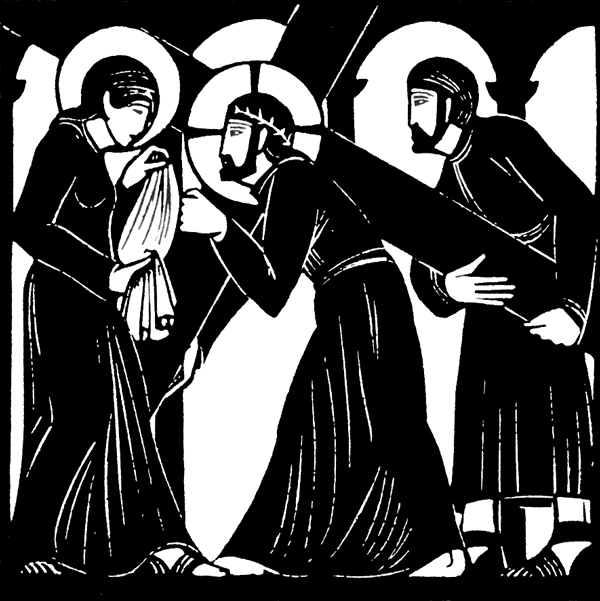
Veronica
“Everyone forgets my name now. But I was there, and I remember seeing him, carrying his cross, his face so covered in sweat and in blood from the soldiers’ blows. He stumbled towards me and almost by instinct I pulled out a small cloth and wiped his face. There was so much sweat and blood that when you looked at the cloth you could see his face. I still have that cloth, a true image of him.”
Prayer
Lord Jesus, your face was sweaty and bloodied:
be with all who care for the broken bodies of our sick and injured.
Your face was wiped by an unknown woman:
let us bear your true image in our hearts, in our words and in our deeds.
To you, Jesus, scarred by a crown of thorns,
be honour and glory with the Father and the Holy Spirit,
now and for ever.
Amen.
illustration: from a wood-engraving by Eric Gill, 1917
7 CommentsSimon helps Jesus carry the cross
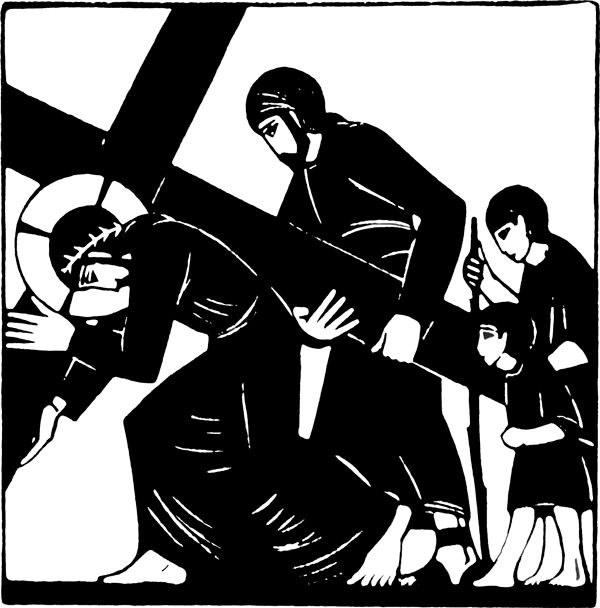
Simon
“I was there to see the Passover. It was big thing in those days, and I’d brought my two boys, Alexander and Rufus. We’d got caught up in this crowd, and I could see that they were taking some prisoners out to be executed. The soldiers saw me and the officer came over, and with his sword he forced me behind one of the prisoners and to take half the weight of the cross. I couldn’t believe how heavy it was: it seemed like I was carrying half the world. At the time, I had no idea who he was.”
Prayer
Lord Jesus, you were worn down by fatigue:
be with those from whom life drains all energy.
You needed the help of a passing stranger:
give us the humility to receive aid from others.
To you, Jesus, weighed down with exhaustion and in need of help,
be honour and glory with the Father and the Holy Spirit,
now and for ever.
Amen.
illustration: from a wood-engraving by Eric Gill, 1917
0 CommentsJesus meets his mother
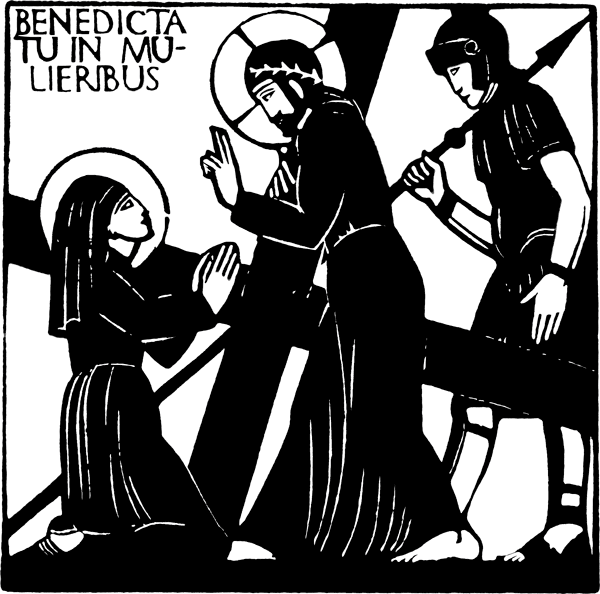
Mary
“O my son, my dear son. It was agony to see you suffering like this. How many mothers have seen their children suffer? I knew what it was like. We, my friends and I, had waited outside the governor’s palace, waiting for you to be freed. And then the soldiers forced you out, carrying a cross. Before they could stop us we ran past them and hugged you. Why was this happening to you? Why? Surely you could have said something, done something, and it would have stopped? Even now? But as he looked at me, I knew this would not happen — I felt as if a sword had pierced my heart.”
Prayer
Lord Jesus, your mother Mary wept at your torment:
give heart to all parents who watch their children suffer.
Your mother felt your pain in her heart:
guide us to bring the fullness of life to children and parents.
To you, Jesus, Son of God and Son of Mary,
be honour and glory with the Father and the Holy Spirit,
now and for ever.
Amen.
illustration: from a wood-engraving by Eric Gill, 1917
4 CommentsJesus falls the first time
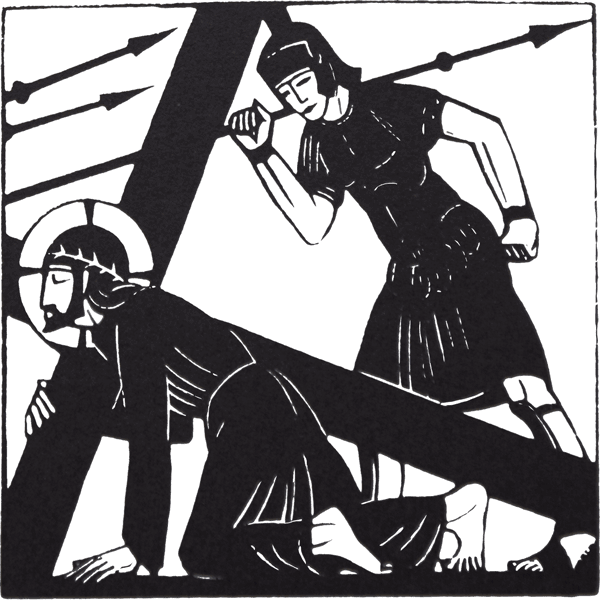
a woman
“I was standing outside the governor’s palace. It was just before Passover and a crowd had gathered to see if the governor would release any prisoners. We’d cheered the news that Barabbas was to be freed. But then the soldiers came out with some other men, taking them to be executed. They were each carrying their crosses, but this one was already weak. The weight of what he was carrying seemed crushing. He lurched towards us, and he stumbled right in front of me. The soldiers were straight in with their spears; they picked up the cross, dragged him to his feet, and carried on.”
Prayer
Lord Jesus, you suffered like us under the burdens of this world:
be with those whose strength is taken away by ill-treatment or illness.
You are present in our suffering and share our loads:
help us to let you carry our burdens.
To you, Jesus, falling under the weight of the cross,
be honour and glory with the Father and the Holy Spirit,
now and for ever.
Amen.
illustration: from a wood-engraving by Eric Gill, 1917
1 CommentJesus takes up his cross
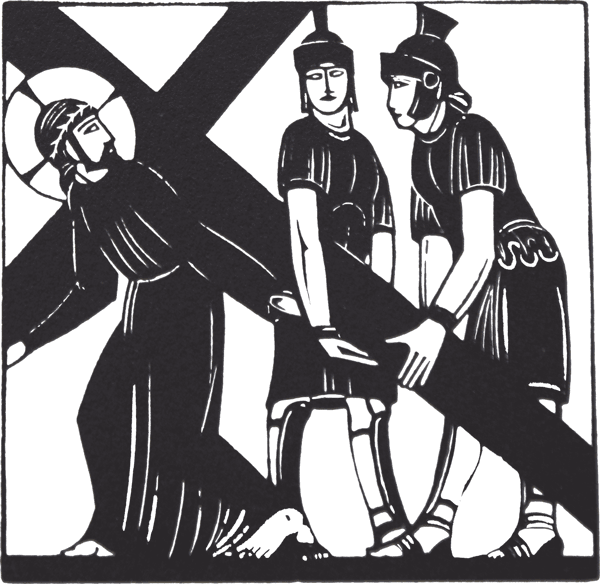
a soldier
“I was a soldier in Pilate’s guard on duty that day. Once Pilate had passed the sentence of death it was our job to carry it out. So we marched him out from Pilate round to our courtyard. That’s where we used to have our bit of fun: we dressed him up and mocked him and spat at him, and some of my mates roughed him up a bit. Then we got out a cross for him. He knew that he had to carry it, but he didn’t seem strong enough to carry that weight. But with our spears and swords, he had no choice.”
Prayer
Lord Jesus, you carried the cross through the rough streets of Jerusalem:
be with those who are loaded with burdens beyond their strength.
You bore the weight of our sins when you carried the cross:
help us to realize the extent and the cost of your love for us.
To you, Jesus, bearing a cross not your own,
be honour and glory with the Father and the Holy Spirit,
now and for ever.
Amen.
illustration: from a wood-engraving by Eric Gill, 1917
0 CommentsPilate condemns Jesus to death
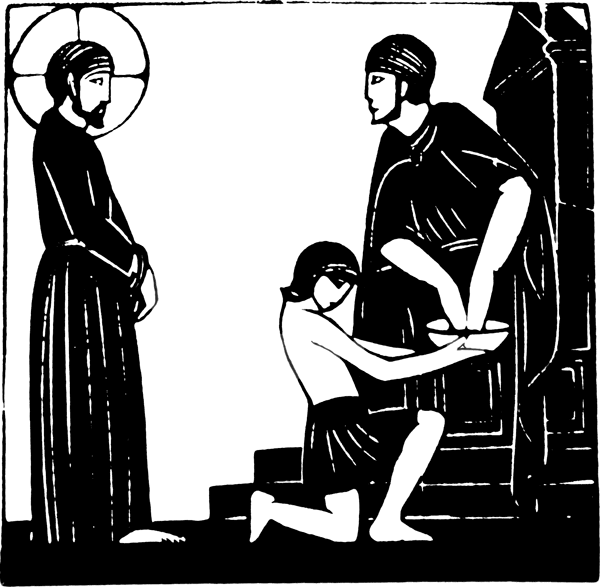
a young slave
“I was a slave in Pilate’s household in Jerusalem. There were lots of people there, jostling and pushing, and over to one side were the Jewish priests, keeping themselves separate. Pilate wanted some water and I was sent for it. I brought in a bowl and a towel and he dipped his hands in the bowl and dried them on the towel. That’s what I remember. Then Pilate said, ‘Take him away and crucify him!’ Only then did I see him — standing, shackled in front of Pilate. I wondered what he had done.”
Prayer
Lord Jesus, you were condemned to death for political expediency:
be with those who are imprisoned for the convenience of the powerful.
You were the victim of unbridled injustice:
change the minds and motivations of oppressors and exploiters
to your way of peace.
To you, Jesus, innocent though condemned,
be honour and glory with the Father and the Holy Spirit,
now and for ever.
Amen.
illustration: from a wood-engraving by Eric Gill, 1917
6 CommentsPoverty Sunday
Sunday 22 June is Poverty Sunday, a campaign run by the Church Urban Fund. David Walker, Bishop of Manchester and a trustee of the CUF, urges churches to pray and to pledge to act.
There’s always something ambivalent in a Franciscan writing about tackling poverty. St Francis, though born into one of the wealthiest families in the town of Assisi, gave up everything. He spoke of ‘Lady Poverty’ in the same language that the romantic troubadours and medieval knights would use to describe the earthly ‘Lady’ to whom they offered utter devotion. But then there is huge difference between that poverty which is freely embraced, in order to enjoy release from material concerns, and the poverty which is forced upon an individual or household.
Francis and his followers in fact did much to alleviate this latter. And in tackling it they challenged one of the worst aspects of how poverty was viewed at the time, they made no distinction between the deserving and the undeserving. Lepers in particular, who were commonly thought to have brought their plight and consequent destitution upon themselves, were at the heart of the ministry of the first group of Franciscan brothers.
What saddens me most, as I reflect upon the present attitude to poverty in the UK, is that this false distinction seems once again to lie at the heart of social policy, and to be accepted as such both by government parties and by the mainstream opposition. Were it genuinely an issue of affordability, that the costs of supporting some who could be identified as undeserving were such a large portion of the welfare budget, then I would understand it from an economic perspective, even whilst deprecating it as theologically deficient. But that patently is not the case. The costs of treating our poorest people better, of treating all poverty as a reality not a sin, represent a very small proportion of the budget. They could probably be met if the five largest global companies from among those who avoid almost all UK corporate taxes were made to pay on the basis of the actual work they do here.
Jesus, who like Francis made himself poor for the sake of the gospel, tells us that we shall always have the poor with us. Not as a reason for doing nothing about poverty, but as a reminder that some challenges will be there for his disciples to tackle even after he has accomplished his earthly ministry. When he himself showed compassion on the poor he did not set some standard of prior merit that the recipients of his bounty needed to attain and evidence. Indeed the very theology of grace that underpins his teaching is alien to such a notion.
So here we are again, another Poverty Sunday and poverty has got no better since the last. We can continue to tackle it through the direct action of our food banks and other projects. We can continue to tackle it by speaking out against the causes of poverty, not least by challenging policies that exacerbate it or add to the numbers condemned to face it. We can tackle it too by seeking to refute the rhetoric of the ‘undeserving poor’. And we will have Jesus and Francis at our sides.
1 CommentPuppet on a string
Giving isn’t always entirely what it seems. Giving by governments to developing countries is particularly notorious for being linked to the economic benefit that might be accrue to the donor. Whilst the UK government is probably better than many at resisting that siren call, you can still guarantee that every year or two some prominent politician will advocate linking UK aid to the purchase of UK products. At its worst it stretches all the way to pressing upon recipients products such as military equipment that many of us might feel are well off the top of the shopping list of the neediest people in whichever nation it may be. It’s not really giving, it’s just a crafty way to subsidise our own industries and services.
Churches can give like that too. I remember in my early years as a vicar visiting a parish in a very poor neighbourhood. They were getting considerable financial support from a wealthy parish elsewhere. What became clear very quickly was that the price of this generosity was that the recipient parish would be ‘sound’ on a particular set of theological positions. I’m sure the rich parish justified its stance on the basis that it was paying for Christian mission, and if the poorer one took a different stance then the work it did would no longer be advancing the Kingdom. For my part I prefer the phrase ‘bribery and corruption’.
And if we imagine that such failings lie only with institutional giving, then a recent and particularly stark example at the individual level is what happened to one charity earlier this year when its USA arm announced it would not refuse to employ people in same sex marriages. The recipients of the ‘generosity’ clearly mattered less than the theological presuppositions of some of the donors. That’s not giving, it’s just using our money to advance our own ends.
So what I like about Christian Aid Week is that it encourages us to go back to proper giving. Giving without strings. Giving for no other reason than to improve the lives of others. When I put my money in the envelope, or see my Standing Order go from my bank account, I am trusting a charity with a very wide brief, and that encompasses a huge diversity. I’m trusting it to make its own mind up as to where that money may best be spent. It’s not that I don’t care about the people who will benefit, it’s that I care enough to want to distance the choice of recipients from my own preferences and prejudices. I want to be adamant that there is nothing I expect by way of return.
My prayer is that the act of giving to Christian Aid Week can then help me to recognise where, in other areas of my life, I am claiming a false generosity that disguises (perhaps most of all to my own self) my mixed and muddied motives.
David Walker is Bishop of Manchester
6 CommentsDo not be afraid
The tag-line for this Christian Aid week, and for these Thinking Anglican reflections, is ‘Fear Less’. We are asked to be part of a movement for change by which those who suffer the immediate horrors of war can live their lives free of fear.
It should be a no-brainer. But then I stopped to think about the society to which this campaign is addressed. How ironic that we are offered this tag-line, asked to make this response, in a culture where fear is one of the great drivers.
How much of the concrete structure of our lives is shaped by fear, fear of those around us, our neighbours? We lock our doors, prime our alarm systems, invest more and more in CCTV, create gated communities, and deny each other the right even to walk up the drive to a front door.
For our children, we fear the random disaster, the wandering lunatic. So they are driven to school, discouraged from playing outside, hedged around by risk assessments and protective clothing. We are even encouraged to fear the home itself: the really, really, good parent, the advertisements assure us, will expunge every lurking germ, every speck of dirt or dust to create a sanitised, frictionless world for the young (though not, interestingly, for the old and vulnerable).
We fear the stranger. So our electoral arguments circle around immigration, and we hide ourselves in our phones, our music, our games, so that we don’t have to engage with that other person on the bus or the underground.
Fears infect the life of our churches. How many conversations are driven by the suspicion that they will not survive as congregations grow older and young people find different ways of expressing faith, if they have any interest in faith at all? In response, we turn inwards, putting all our energies into ever more creative ways of preserving buildings and the patterns of life and worship which they have housed and maintaining the organisational structures as nearly as possible as they have always been.
Some of these fears have substance. But each protective measure, each withdrawal from shared space limits our ability to respond to those whose fear is grounded in the realities of the bomb blast, the shattered limbs, the homes destroyed, the long sentence of the refugee camp. Consumed by our own fears, we have little energy left for empathy, let alone solidarity, with those whose lives hold much greater terrors.
‘Do not be afraid’. The phrase recurs so often in the gospel. It doesn’t mean there is no cause for trepidation. It does require us to have the courage to take risks: to take the small risks of allowing others into our private spaces, of engaging with the messy realities of the created world, of pouring our energies into loving service rather than counting heads; and to take the larger risk of trusting that God’s grace and God’s creation has sufficient for all. And if there is enough for all – then there is enough for a world where men and women and children in places of bitter, bloody conflict may fear less.
Canon Jane Freeman is Team Rector of Wickford and Runwell in the diocese of Chelmsford
1 Comment
